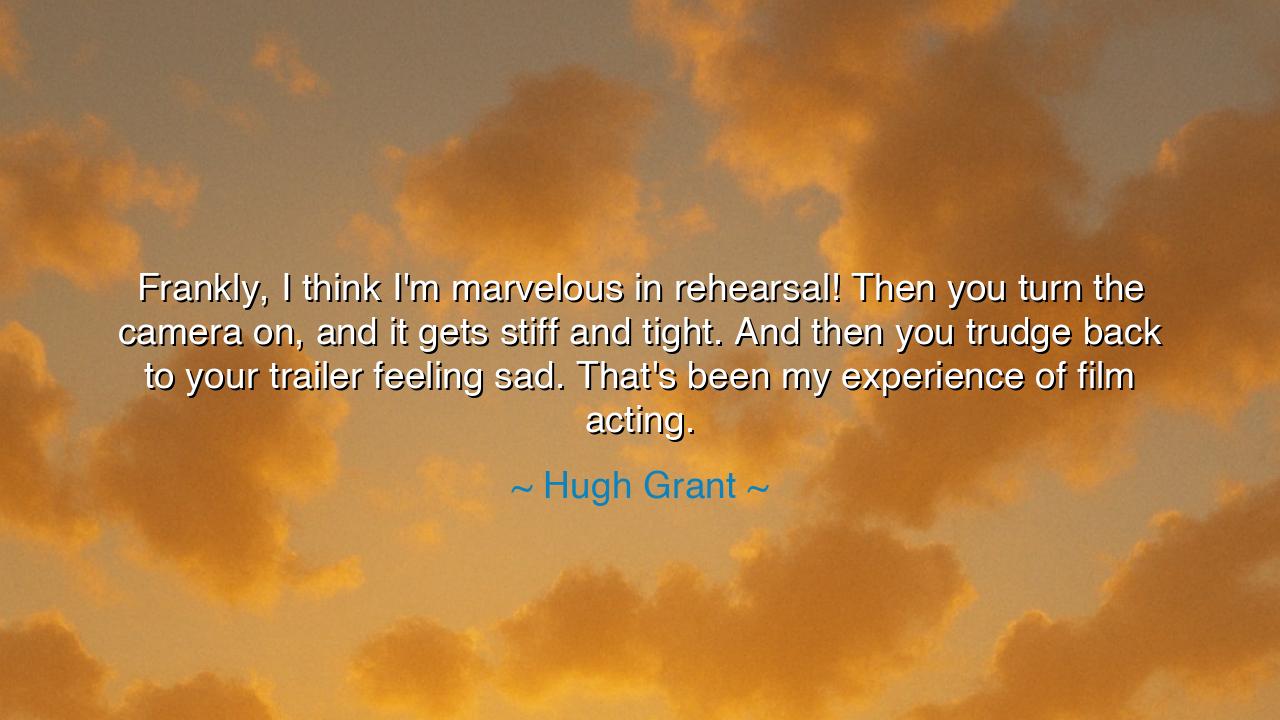
Frankly, I think I'm marvelous in rehearsal! Then you turn the
Frankly, I think I'm marvelous in rehearsal! Then you turn the camera on, and it gets stiff and tight. And then you trudge back to your trailer feeling sad. That's been my experience of film acting.






When Hugh Grant said, “Frankly, I think I'm marvelous in rehearsal! Then you turn the camera on, and it gets stiff and tight. And then you trudge back to your trailer feeling sad. That's been my experience of film acting,” he revealed a universal truth about the human struggle to translate preparation into performance. In rehearsal, the actor feels free, confident, and alive; yet the moment the eye of the world — the camera — bears down, hesitation and self-consciousness emerge. Grant’s reflection is both humorous and deeply poignant: it speaks to the challenge of manifesting potential under pressure, a struggle that has haunted mortals since the dawn of theater itself.
The ancients understood this tension. The Greek playwright Euripides described actors trembling on stage, despite days of rehearsal, as if the gaze of the audience itself could bind the limbs and cloud the mind. Plato, in his Republic, warned of the difficulty of bringing internal knowledge into the realm of action — that a person might understand truth in thought, yet falter when required to embody it. Grant’s lament is a modern echo of this age-old wisdom: knowing what to do and performing it under scrutiny are distinct feats, each demanding courage and resilience.
Film acting, as Grant describes, is uniquely unforgiving. The camera does not forgive subtle missteps; it magnifies hesitation, stiffness, and doubt. A rehearsal that feels marvelous and alive can collapse under the mechanical eye of recording. This is not failure in the true sense, but an inevitable friction between preparation and reality. The actor, like the philosopher or warrior, must confront the moment when the ideal meets the actual, and learn to navigate the discomfort that arises from that clash.
History offers countless parallels. Consider the legendary general Alexander the Great. In strategy and practice, he could envision victories with clarity and precision, yet on the battlefield, the chaos and unpredictability of war tested every plan. Many a soldier faltered despite training, yet those who returned to the fray with humility and perseverance honed their excellence. Similarly, Grant’s “trudge back to the trailer feeling sad” mirrors the ancient acknowledgment that mastery is forged not in the absence of difficulty, but through the repeated encounter with imperfection and self-doubt.
Even the greatest artists have wrestled with this paradox. Leonardo da Vinci, famed for his mastery, left countless sketches unfinished, perpetually revising and seeking perfection. When translating vision into creation, he faced the inevitable gap between conception and execution. Grant’s experience is a theatrical version of this struggle: the rehearsal is the sketch, the camera the final attempt, and the sadness is the artist’s recognition of imperfection. Yet without this process, growth and refinement cannot occur.
Grant’s words also highlight a deeper moral: the value of self-compassion. Actors, artists, and all who perform publicly must accept that vulnerability is inherent in their craft. Feeling “sad” after a performance is not weakness, but a sign of engagement and commitment. The ancients would have seen this as a natural rhythm of human striving — pathos tempered by endurance. The lesson is that imperfection is not the enemy; it is the guide, showing where attention, patience, and effort must be renewed.
The lesson, therefore, transcends the theater. In any human endeavor — be it art, leadership, or scholarship — preparation will never perfectly translate into execution. The challenge is not to avoid failure, but to persist despite it. Each attempt, each moment of discomfort, carries within it the seeds of improvement. Grant’s reflection reminds us that excellence is iterative, forged in the tension between expectation and reality.
So, O listener, carry this wisdom into your own life: approach your rehearsals, your preparations, and your intentions with vigor and confidence, but do not despair when the moment of action feels stiff or imperfect. Feel the sadness, acknowledge it, and return to the work with humility and courage. For it is in this cycle — rehearsal, performance, reflection — that true mastery, resilience, and human growth are cultivated, and that the ordinary labor of preparation becomes the extraordinary art of living.






AAdministratorAdministrator
Welcome, honored guests. Please leave a comment, we will respond soon